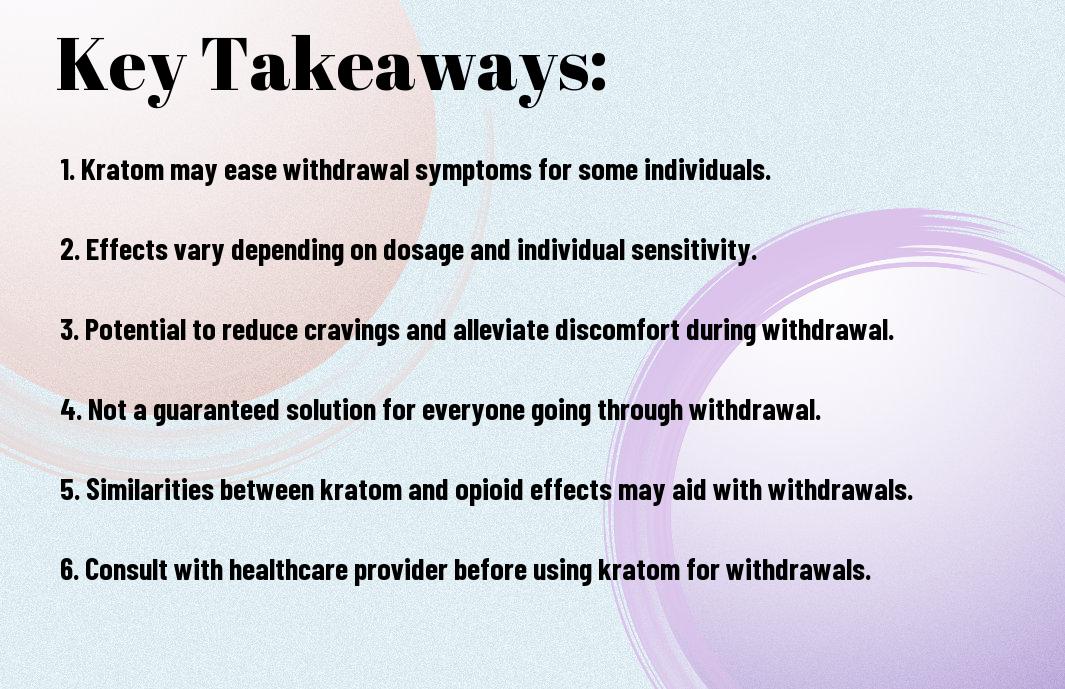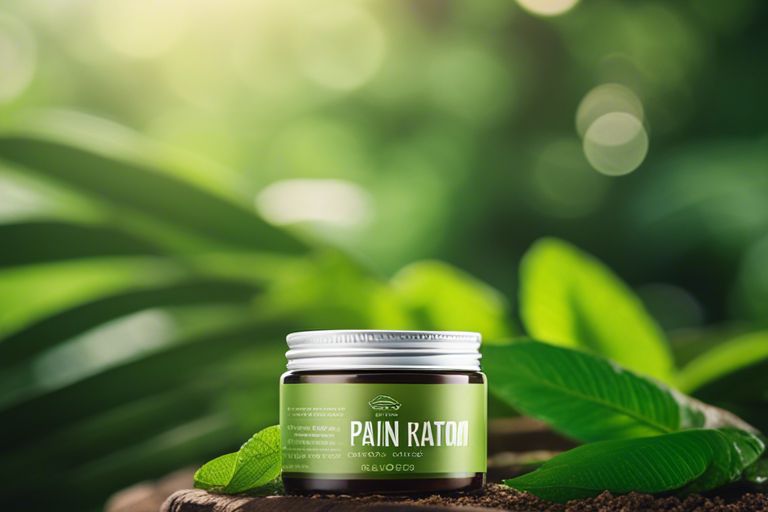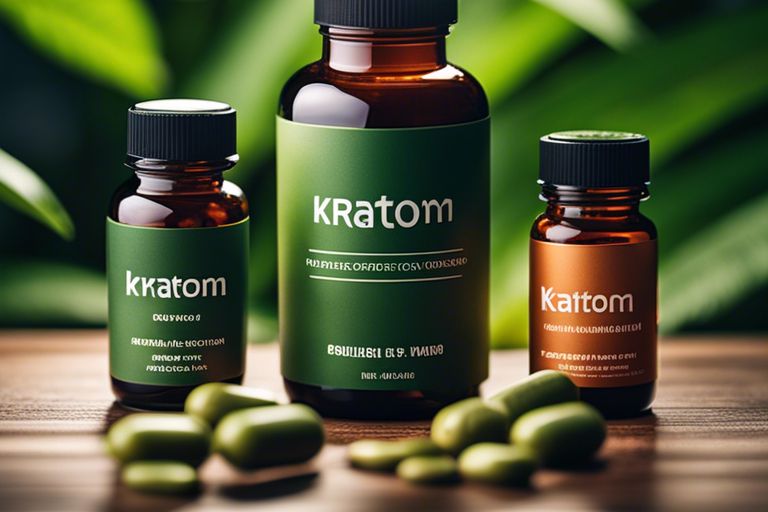It’s a pressing question for many facing addiction issues: can kratom offer relief from withdrawal symptoms? This informative post investigates into the potential benefits and risks of using kratom as a remedy for withdrawal, shedding light on its controversial nature. Understanding the role kratom plays in combating withdrawal symptoms is crucial for those seeking alternative treatment options. Stay informed and explore the possibilities with this insightful guide.
Key Takeaways:
- Kratom may help alleviate withdrawal symptoms: Research suggests that kratom, a plant native to Southeast Asia, may help reduce withdrawal symptoms from opioids and other substances.
- Potential benefits of using kratom: Kratom may act on the same brain receptors as opioids, providing pain relief and reducing cravings, which can help individuals taper off addictive substances.
- Cautions and considerations: While some people find relief from withdrawal symptoms with kratom, it is necessary to use it responsibly and consult a healthcare provider due to its potential for addiction and adverse effects.

What are Withdrawal Symptoms?
To understand how kratom might help with withdrawal symptoms, it’s imperative to first grasp what withdrawal symptoms entail. Withdrawal symptoms are a result of physical and psychological reliance on a substance. When the body is dependent on a substance like opioids, alcohol, or benzodiazepines and that substance is suddenly removed, the body reacts with a series of symptoms as it tries to adjust to the absence of the substance.
Physical Symptoms
Physical symptoms of withdrawal can include muscle aches, sweating, nausea, vomiting, diarrhea, insomnia, and restlessness. These symptoms can vary in intensity depending on the individual’s level of dependence on the substance and the substance itself. They can be incredibly uncomfortable and, in some cases, even dangerous.
Emotional Symptoms
For emotional symptoms, individuals experiencing withdrawal may encounter feelings of anxiety, depression, irritability, mood swings, and sometimes even thoughts of self-harm or suicide. These emotional symptoms can be just as challenging to endure as the physical ones and may require additional support and treatment.
Symptoms of withdrawal can be a daunting experience, both physically and emotionally. Seeking proper support and possibly exploring alternative remedies like kratom under medical supervision may help alleviate some of these symptoms and assist in the recovery process.
What is Kratom?
If you’re wondering, “What is kratom?” you’re not alone. Kratom, scientifically known as Mitragyna speciosa, is a tropical evergreen tree native to Southeast Asia. It belongs to the coffee family and has been used for centuries for its medicinal properties. The leaves of the kratom tree contain active compounds that interact with opioid receptors in the brain, producing a range of effects from pain relief to mood enhancement.
Origin and History
On the historical front, kratom has been utilized in traditional medicine practices in countries like Thailand, Indonesia, Malaysia, and Papua New Guinea. In these regions, kratom was often brewed into teas or chewed to boost energy levels and alleviate aches and pains. Despite its long history of use, kratom has recently gained popularity in the Western world for its potential therapeutic benefits.
Chemical Composition
Originating from the leaves of the kratom tree, its main active components are mitragynine and 7-hydroxymitragynine. These alkaloids are responsible for the effects kratom has on the body and mind. Research suggests that mitragynine may interact with opioid receptors in a way that is less dangerous than traditional opioids, potentially offering a safer alternative for pain management and opioid withdrawal.
Another notable aspect of kratom’s chemical composition is its potential for addiction and dependence. While kratom may offer benefits for some individuals, misuse or overuse can lead to unwanted side effects and withdrawal symptoms. It is crucial to approach kratom use with caution and to seek guidance from healthcare professionals.
How Does Kratom Work?
Opioid Receptors and Pain Relief
Unlike traditional opioid medications that directly target opioid receptors in the body, kratom contains alkaloids that interact with these receptors in a more subtle manner. The active compounds in kratom, such as mitragynine and 7-hydroxymitragynine, bind to mu-opioid receptors in the brain, which are involved in pain sensation and regulation.
Mood Enhancement and Anxiety Reduction
Opioid receptors are not only responsible for pain modulation but also play a role in mood regulation and anxiety levels. Kratom’s interaction with these receptors can lead to mood enhancement and a reduction in anxiety symptoms. Users often report feeling a sense of calmness, improved mood, and a reduction in stress and anxiety levels after consuming kratom.
To further elaborate, kratom’s ability to activate delta-opioid receptors can contribute to its mood-enhancing effects. These receptors are known to modulate mood and emotions, which may explain why kratom users experience feelings of euphoria and well-being when consuming the plant.
Can Kratom Help with Withdrawal Symptoms?
Reducing Physical Discomfort
Symptoms of withdrawal from substances like opioids can be incredibly challenging both physically and emotionally. Kratom, a plant native to Southeast Asia, has gained attention for its potential to help alleviate withdrawal symptoms. Some users report that kratom can reduce physical discomfort such as muscle aches, joint pain, and nausea during withdrawal.
Managing Emotional Distress
For individuals going through withdrawal, emotional distress can be just as overwhelming as physical symptoms. Kratom may also help in managing emotional distress by promoting a sense of calmness and relaxation. Some users have reported feeling less anxious and more at ease when using kratom during withdrawal.
For those considering using kratom to help with withdrawal symptoms, it is vital to approach it with caution and under the guidance of a healthcare professional. While some find relief with kratom, others may experience negative side effects or potential risks. It’s crucial to be well-informed and aware of the possible consequences.
Case Reports and Anecdotal Evidence
On the topic of kratom’s effectiveness in managing withdrawal symptoms, there have been case reports and anecdotal evidence suggesting its potential benefits. Some individuals have shared their positive experiences with using kratom to alleviate withdrawal symptoms from opioids and other substances. However, it is important to note that these reports are not substitutes for rigorous scientific research.
Understanding the potential of kratom to help with withdrawal symptoms requires a nuanced approach. While some find relief with kratom, others may experience adverse effects, dependency, or addiction. It’s vital to weigh the pros and cons carefully and seek professional advice when considering using kratom for managing withdrawal symptoms.
Potential Risks and Side Effects
Addiction and Dependence
Risks associated with kratom use include the development of addiction and dependence. According to SAMHSA’s National Helpline, long-term use of kratom can lead to physical dependence, where the body adapts to the presence of the substance and experiences withdrawal symptoms when use is stopped. Individuals with a history of substance abuse are at higher risk of developing a kratom use disorder.
Interactions with Medications
The use of kratom may interact with certain medications, including antidepressants, antipsychotics, and opioids. The active compounds in kratom can affect the body’s metabolism of these medications, leading to potentially dangerous interactions. It is imperative to consult with a healthcare professional before using kratom if you are taking any prescription medications to avoid any adverse effects.
Reported Adverse Effects
With kratom use, reported adverse effects include nausea, constipation, dry mouth, increased urination, and loss of appetite. More severe side effects may include seizures, hallucinations, and respiratory depression. It is crucial to monitor for any adverse effects and seek medical attention if experiencing any concerning symptoms.
Based on the potential risks and side effects associated with kratom, individuals considering its use should proceed with caution and consult with a healthcare provider to weigh the potential benefits against the possible drawbacks. Effects of kratom can vary from person to person, and it is imperative to be well-informed and mindful of how the substance may impact your health and well-being.

Comparing Kratom to Traditional Treatments
Pharmaceuticals vs. Natural Remedies
All pharmaceutical medications used for treating withdrawal symptoms come with potential side effects and risks. On the other hand, kratom is a natural plant-based remedy that is believed to have fewer side effects. While pharmaceuticals may require a prescription and can be costly, kratom is often more accessible and affordable for individuals seeking relief from withdrawal symptoms.
Success Rates and Efficacy
Rates of success and efficacy can vary when comparing kratom to traditional pharmaceutical treatments for withdrawal symptoms. Some studies suggest that kratom may be effective in managing withdrawal symptoms, but more research is needed to determine its full efficacy. Pharmaceutical treatments, on the other hand, have been extensively studied and are known to be effective in managing withdrawal symptoms in many cases.
With further research and clinical trials, the efficacy of kratom in treating withdrawal symptoms can be better understood. It is important to consider the individual needs and health conditions of each patient when determining the most suitable treatment option.
Patient Preference and Satisfaction
Traditional pharmaceutical treatments are often prescribed by healthcare providers and are widely accepted in the medical community. However, some patients may prefer natural remedies like kratom due to a perceived lower risk of side effects and a more holistic approach to treatment.
Satisfaction with treatment can play a significant role in a patient’s overall recovery experience. Providing patients with options and discussing the benefits and risks of different treatments can help them make informed decisions that align with their preferences and goals.
Can Kratom be Effective in Alleviating Withdrawal Symptoms from Substance Use?
Yes, Kratom can be effective in alleviating withdrawal symptoms from substance use. According to the complete guide to kratom benefits, it can help manage cravings, reduce anxiety, and ease physical discomfort during the withdrawal process. However, it is important to use it under the guidance of a healthcare professional.
Is Kratom Powder Effective for Managing Withdrawal Symptoms?
Yes, kratom powder for pain relief has been found to be effective in managing withdrawal symptoms. Many people have reported that kratom powder has helped them alleviate the discomfort associated with withdrawal from opioids and other addictive substances. Its natural pain-relieving properties make it a popular choice for those looking for alternative forms of relief.
Summing up
Hence, it can be concluded that kratom may indeed have the potential to help individuals experiencing withdrawal symptoms. However, further research and clinical studies are necessary to fully understand its efficacy and safety in this specific context. A recent kratom tea study mentioned in Kratom tea study stirs up new support for relieving opioid dependence sheds light on promising findings, highlighting the importance of continued investigation into this herbal supplement’s benefits.
FAQ
Q: What are withdrawal symptoms?
A: Withdrawal symptoms are a set of physical and psychological effects that occur when someone stops using a substance they have developed a dependence on.
Q: Can kratom help with withdrawal symptoms?
A: Some individuals have reported that kratom has helped alleviate withdrawal symptoms from substances like opioids, but more research is needed to fully understand its effectiveness and safety.
Q: How does kratom work in relation to withdrawal symptoms?
A: Kratom contains alkaloids that interact with opioid receptors in the brain, potentially providing relief from withdrawal symptoms. However, its mechanisms of action are not fully understood.
Q: What are the potential risks of using kratom for withdrawal?
A: Kratom can be addictive and may lead to dependence and withdrawal symptoms of its own. It can also have side effects such as nausea, constipation, and increased heart rate.
Q: Is kratom legal and regulated?
A: The legal status of kratom varies by country and region. In some places, it is illegal to buy, sell, or use kratom. It is important to research and understand the laws regarding kratom in your area before considering its use for withdrawal symptoms.









